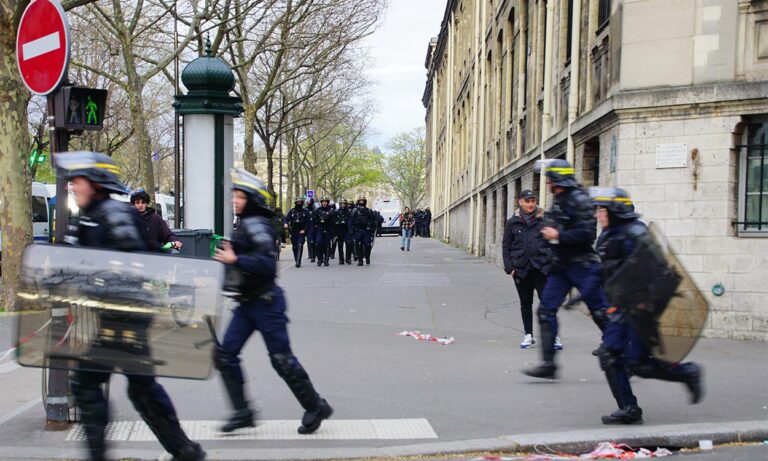French riots fuel far-right National Rally’s march into the mainstream. Why is no one reporting on it?
Over the past ten days, France has witnessed a surge in protests, riots, and social unrest. While the media coverage has predominantly focused on what led to these violent events, there is a concerning lack of attention given to the rise in the far-right political party the National Rally’s power and influence. Highlighting the broader political extremist division within the nation and the potential ramifications for increased racism and discrimination against minorities is fundamental.
What is the National Rally and why is it picking up steam now?
The National Rally, until 2018 known as the National Front, is a far-right political party in France. Over the last few years, and even more so since the killing of 17-year-old Nahel Merzouk, it has experienced a significant resurgence.
Originally founded in 1972 by Jean-Marie Le Pen, whose daughter Marine Le Pen followed in his footsteps as party leader up until stepping down in 2021, the National Rally is now under the leadership of Jordan Bardella, a 27-year-old who joined the party as a teenager.
Jean-Marie Le Pen gained notoriety for espousing extreme ideologies including xenophobia, anti-immigration sentiments, and Euroscepticism. His provocative and inflammatory rhetoric, which included hate speech and Holocaust denial, earned him the notorious nickname of ‘the Devil of the Republic’.
And although Marine was the one who began the work to restore the controversial party’s image by keeping some of its most problematic stances quiet, for the first time in 50 years, it looks like her plan might actually be working. The far-right party is picking up steam among French citizens, and it’s doing so scaringly fast.
Following her election as party leader back in 2012, the then-National Front underwent an intense process of ‘de-demonisation’ in which Le Pen aimed to broaden the party’s appeal and shed its extremist image.
Focusing on issues such as national identity, immigration, and security, Le Pen pretended to position the party as neither left nor right, appealing to a wider spectrum of voters—and it worked perfectly for her. The National Rally’s popularity grew under her leadership, and by 2015, it had established itself as a major political party in France.
Despite previously giving the impression of wanting to retire from politics, Le Pen has gradually made a comeback as a prominent figure of the National Rally. In a surprising turn of events, she has garnered a growing following of individuals who wish to see her return to power, as recently shown by incredibly high poll ratings during the country’s latest Presidential election.
Since then, polls have revealed that the gap between Emmanuel Macron and Le Pen has further narrowed, causing understandable concern within the current President’s camp ahead of 2027.
Despite persistent criticism from political opponents, public perception of both Le Pen and her highly problematic and threatening party has undergone a shift.
The role of the National Rally and its violent supporters in the French riots
Beyond the rise of the National Rally’s popularity, France is grappling with an even broader political extremist division. Fueled by economic disparities, cultural clashes, and a sense of alienation, this has in turn created a fertile breeding ground for radical ideologies. The ongoing protests and riots have further exacerbated these divisions, magnifying the potential for deep-rooted social strife.
As the National Rally continues to gain more power and influence, there is a genuine concern that the party’s rhetoric could embolden and legitimise acts of racism and discrimination against minorities. The history of such extremist movements in Europe serves as a stark reminder of the dangers posed by the normalisation of xenophobia and hatred.
Far-right extremists and their quest to restor order
In the midst of this socio-political turmoil, fringe groups like far-right extremists and National Rally supporters are seeking to exploit the chaos in order to position themselves as enforcers of law and order. These individuals, known for their propensity for violence, attempt to take advantage of the prevailing unrest to advance their own divisive agendas.
SCREENSHOT sat down with Momo, a Parisian of Senegalese-French descent, who described the recent riots as resembling scenes from an apocalyptic movie, with the city engulfed in flames while simultaneously witnessing avid photographers capturing images of Cardi B and other celebrities attending Paris Fashion Week.
Talking about his experience attending one of the many protests that have since spread across the nation, Momo shared: “I didn’t want to leave the house, but my friend insisted for me to come. What I witnessed that night left me in shock—storms of skinheads were running up and down the street, with massive iron chains and swastikas on top of their jackets, with a chorus of people screaming ‘France for French people’.”
Such extremist factions, if left unchecked, could undermine the fabric of French society and perpetuate a cycle of violence and discrimination. Heck, it’s not only France that’s seeing a rise in far-right extremism. Whether in Italy, Spain, or Finland, as noted by The Guardian, “across Western Europe, far-right parties are advancing: climbing steadily up the polls, shaping the policies of the mainstream right to reflect nativist and populist platforms, and occupying select ministerial roles in coalition governments.”
So why is no one reporting on the far-right’s terrifying march into the mainstream, and what are we going to do about it?






